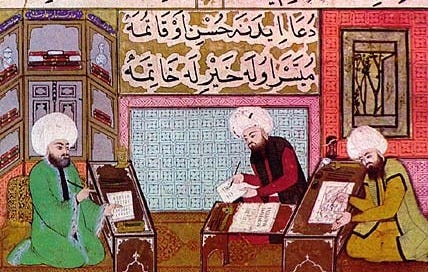I’ve been writing about Ottoman and Middle Eastern history on my Substack since August 2024. My goal has been to make these topics more accessible for a general audience and contribute to the Substack community by sharing my expertise. And you have been gracious enough to show an interest in my work and support it. I truly appreciate that.
Now I want to take this work a step further.
I’m planning on launching a 10-week online course on the history of the early modern Ottoman Empire (1300-1800). It will cover the period from Ottomans’ early rise in the 14th century through to the early 19th century. Some of the themes I plan on exploring in it will include but are not limited to:
How the Ottomans, starting from humble beginnings as a small Turkish principality, built a global empire
The crises and tribulations that the Ottomans went through in the 17th and 18th centuries and how the Empire evolved and adapted.
The cultural and daily life in the Empire.
Key Ottoman institutions, like the palace, the harem, and the janissaries that fascinate people even today.
The course will be modeled on an entry-level university class but will be designed to be more accessible and engaging for a general audience. It will be of interest for anyone who is interested in the history of the Ottoman Empire. It doesn’t matter if you have a background in Ottoman/Islamic history or not. Everyone will find something to their liking.
Here is how I think of structuring it:
🎥 Weekly pre-recorded lectures that you can watch anytime.
💬 Weekly live Q&A sessions, where we discuss the week’s materials
📚 A curated reading list, including primary sources
Since designing and delivering such a course, which will include recording lectures, preparing materials, and hosting live Q&As, will take a lot of effort, I will offer this as a paid class. It will, however, be priced fairly and will definitely be packed with information.
I’m still in the early stages of designing this project, aiming for a Fall 2025 launch. Before I truly committed to it, I wanted to ask you two things:
Would you be interested in taking a course like this?
What would you most want to learn?
Please let me know in the comments below. Even a short reply would be really helpful.
And if you know anyone who would be interested in this project, please share this post with them.
I’m looking forward to hearing from you. I’m really excited about this and hope you are too.
One last thing: If you haven’t already done so, please consider subscribing to my newsletter if you don’t want to miss any updates on the course and/or want to learn more about Ottoman and Middle Eastern history in general.
Thank you very much once again for all your support.
Until next time!





This is a fantastic idea; thanks for doing this. What interests me the most about history is how people lived their day-to-day lives. It’s an aspect that gets cast aside too often to discuss bigger things, such as politics, wars, culture, etc. I want to know what a day in the life of a regular citizen was like, what education was like, entertainment, cultural exchanges, science, etc. Good luck with the course!
Totally interested! Not just sure yet how much I'd pay--depends on model/struggle.
Topics of particular interest:
- Economic reach, structures of the empire, and how it approached administering trade, taxes in the regions it claimed.
- Industry and innovation, esp. re early gunpowder weapons.
- Administration and bureaucracy. I know a little about the Janissary and Eunuch corps, but I don't fully understand how the empire was administered, the role different groups played, etc.
- Central/defining tensions. In the US we talk about the tensions between state and federal government as a principle source of strength, but also a threat to national identity/cohesion. I'm curious about how peoples within the empire saw it, and the extent to which they identified with the empire, and–in a more abstract sense–what forces were drawing the empire together or tearing it apart.
- Sultanate of women
- Infrastructure and development within the empire. Public works building, esp. the role of the Valide sultan in driving this.